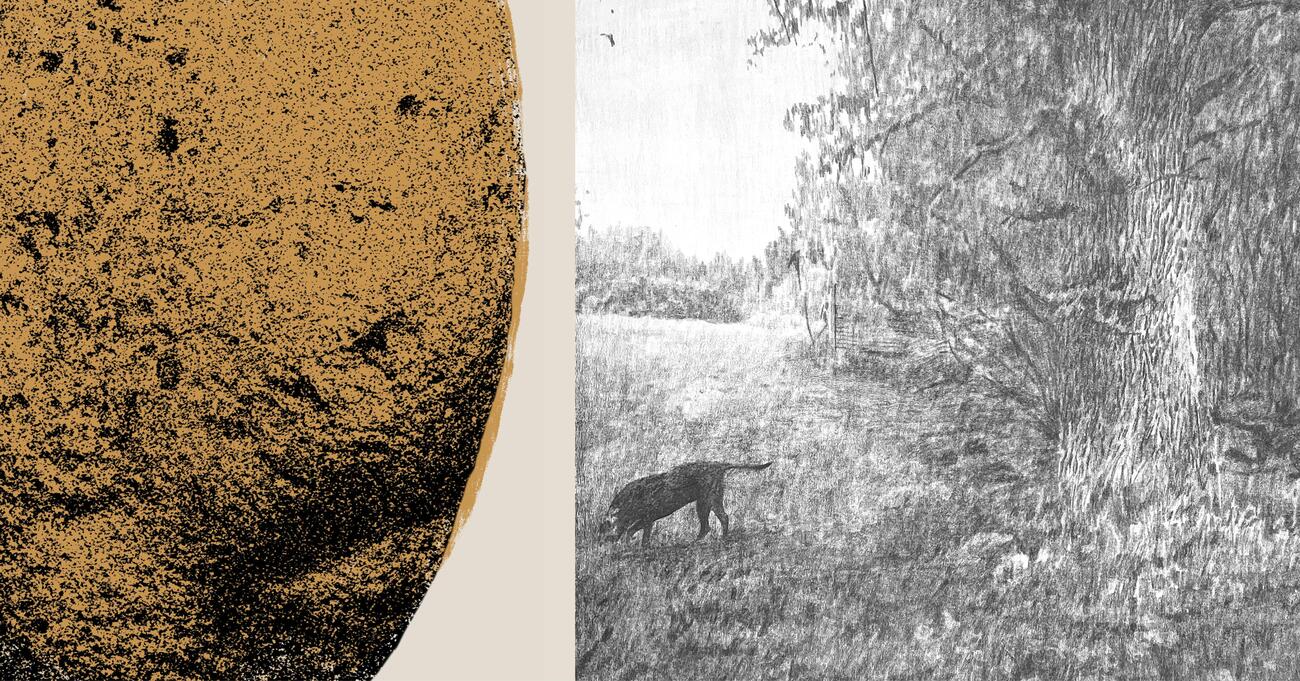
Exhibition:
Agate Lielpētere and Luīze Rukšāne
Gallery Kresija, Stritarjeva ulica 6, Ljubljana, Slovenia
23.7. – 28.8. 2025
When focusing on the ‘culture’ in agriculture, we talk about caring or tending, yet globalisation and growing demands push us to expand into natural environments. Efficiency-driven farming reduces the presence of native varieties in the land we care for — plants that have become part of our culture and identity.
The exhibition’s title ‘Zemlja’ considers all the meanings of the word: soil, earth, a piece of land, our piece of land, our planet. It marks a path that leads us from microorganisms to a planetary scale. The two artists invite us to explore where we belong in this chain, and what our relationship with it is. How does our soil smell? What grows in it? What did our grandparents grow in it? How do we tend to it? The answers to these questions offer insight not only into our agricultural practices but also into the cultural framework of our identity. By understanding our soil and land, we can also learn something about our roots. Ignoring grand narratives of national belonging, the artists zoom into smaller units of land, questioning identity as an intimate reality.
Historically, Latvia has been a nation of devoted potato consumers. In 2018, it ranked third in Europe for potato consumption per capita, at 113 kg per person (FAO). Many domestic potato varieties have been cultivated in response, often named after women significant to their breeders — their mothers, wives, or daughters. Thus, Agate Lielpētere argues that potatoes and women are Latvia’s national treasures. Meanwhile, Luīze Rukšāne expands on these themes by investigating the intricate connections between femininity, fertility, labour, and the Latvian landscape. The exhibition forms a conversation around the natural and the cultured, nature versus nurture in a search of an understanding of one’s sense of self.
Lielpētere’s silkscreens and sculptures portray women and the potato varieties that bear their names. These pieces enable viewers to look both the women and the potatoes in the eye simultaneously. As well as the ‘Latvian women’, the artist includes the once popular Slovenian variety Igor, nearly wiped out by the Y virus. In an effort to keep him in our collective memory—and hoping for new love to spur—she introduces him to the Latvian varieties such as Magdalena, Zīle, Laimdota. For her sculptures, she uses stones primarily found in potato fields to emphasise their connection to the natural world. “A stone is a mass of hard, compacted mineral that has formed over a long period of time. Somehow, I think this is a fitting metaphor for Latvian women,” Lielpētere reflects. She also notes, with a touch of irony, that to this day, no Latvian potato variety bears her name, though there is a corydalis named after Luīze that was bred by her grandfather.
By contrast, Rukšāne’s large-scale graphite and charcoal drawings provide context and more concretely visualise the environments that characterise the Latvian landscape, as seen from an intimate, secluded viewpoint. She omits colour, enabling viewers to experience these spaces through light, shadow, texture, and composition, free from the distraction of hue. The motifs she depicts are small excerpts of the land, gently inviting us to search for traces of identity under a rock, in a stork’s nest, or in the labour of a potato harvest — places where one might not expect to find it, but where, with intention, it quietly reveals itself.
Agate Lielpētere (b. 1995, Latvia) is a visual artist living and working in Ljubljana. She holds a BA in Arts and Humanities (graphic art) from the Art Academy of Latvia. She has held six solo exhibitions in Riga and Ljubljana, and has participated in numerous group exhibitions both locally and abroad, including Ljubljana, London, Riga and Tokyo, exhibiting, e.g., in Moderna galerija in Slovenia and Kim? Contemporary Art Centre, and the Latvian Centre for Contemporary Art in Latvia. Her work is included in the Zuzāns private collection of contemporary art. Lielpētere’s artistic work can be described as subtly humorous, focusing on social narratives and questions of identity.
→ www.agatelielpetere.com
Luīze Rukšāne (b. 1995, Latvia) is a visual artist working primarily with drawing, distinguished by its sensitivity to surface, light, and emotional tone. Her work navigates themes of memory, time, and domesticity, offering subtle reflections on personal and collective histories.
Rukšāne holds a BA from the Art Academy of Latvia and is currently studying at HFBK Hamburg. Her solo exhibition Folding Lines (2024) received critical acclaim and won the public vote for the 2025 Purvītis Prize, Latvia’s most prestigious visual art award. She has participated in exhibitions across Europe, and her work is included in the collections of the Latvian National Museum of Art, the VV Foundation, and private collections.
→ www.luizeruksane.com
Text: Agate Lielpētere
Producer: Luka Piškorič
With support of Latvian State Culture Capital Foundation and Gallery Kresija/Municipality of Ljubljana.
